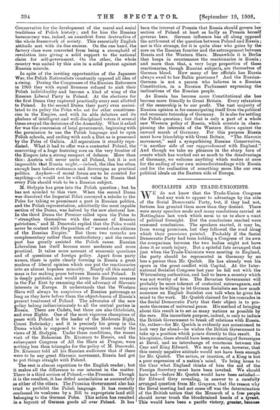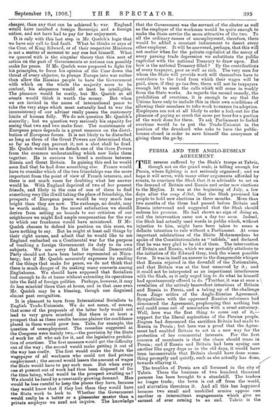SOCIALISTS AND TRADE - UNIONISTS.
WE do not know that the Trade-Union Congress had any wish to appear to advantage by the side of the Social Democratic Party, but, if they had not, fortune has granted them more than they desired. There were many speeches made and many resolutions carried at Nottingham last week which seem to us to show a want of political foresight. But the conclusions reached were reasoned conclusions. The speakers started, it may be, from wrong premisses, but they followed the road along which their premisses pointed. Probably if the Social Democratic Party had been holding a Congress of its own the comparison between the two bodies might not have done it so much injury. But a spiteful fate arranged that just when the Trade-Unionists were meeting in England, the party should be represented in Germany by no, less a person than Mr. Quelch. He has already won his spurs in the great conflict with Capital. At the Inter- national Socialist Congress last year he fell out with the Wurtemberg authorities, and had to leave a country which was not worthy of him. The Bavarian Government will probably be more tolerant of oratorical extravagance, and may even be willing to let German Socialists see how much nonsense an English Socialist can talk when he gives his mind to the work. Mr. Queloh claimed for his comrades in the Social Democratic Party that their object is to pro-. mote the cause of universal peace. His method of bringing about this result is to set as many nations as possible by the ears. His immediate purpose, indeed, is only to induce the British Government to break off relations with Russia. Or, rather—for Mr. Quelch is evidently not accustomed to look very far ahead—he wishes the British Government to take up a position which points directly to this result, In his opinion, there should have been no meeting of Sovereigns at Revel, and no interchange of courtesies between the Czar and King Edward. We may be sure, however, that this merely negative attitude would not have been enough for Mr. Quelch. The action, or inaction, of a King is but a poor expression of a nation's mind. To bring home to the Czar what England thinks of him the aid of the Foreign Secretary must have been invoked. We should have had—before Mr. Queloh would have been satisfied— Sir Edward Grey revealing, in answer to a carefully arranged question from Mr. Grayson, that the reason why the Revel meeting had not come off was the determination of the British nation that the Monarch of a free people should never touch the bloodstained hands of a torrant, This would have been a pacific victory, greater, because cheaper, than any that can be achieved by war. England would have insulted a foreign Sovereign and a foreign nation, and not have had to pay for het enjoyment. ft i§ Only with this last step in Mr. Quelch's logic that we have any call to find fault. What he thinks or says of the Czar, of King Edward, or of their respective Ministers is not a matter of MOhient to any one but himself. What we quarrel with is the singular theory that this sort of action on the part of Governments or nations can possibly Make for peace. If Mr. Quelch were prepared to fight for his principles, to force his opinion of the Czar down the throat Of every objector, to plunge Europe into war rather than allow the Russian people to have the Government With which on the whole the majority seem to be content, his eloquence would at least he intelligible. The pleasure would be costly, but Mr. Quelch at all events would think it worth the money. But when we are invited in the name of international peace to take the very steps which most naturally lead to war the inconsistency of our adviser really passes the customary limits of human folly. We do not question Mr. Quelch 's sincerity ; but we question very seriously his capacity for seeing that two and two make four. The maintenance of European peace depends in a great measure on the distri- bution of European forces. It is not likely to be disturbed so long as three of the Great Powers are determined that so far as they can prevent it, not a shot shall be fired. Mr. welch would have us detach one of the three Powers from the common understanding which now links them together. He is anxious to breed a coolness between Russia and Great Britain. In gaining this end he would soon find that he bad done something else. France would have to consider which of the two friendships was the more important from the point of view of French interests, and there is not Muth room for doubting what her answer would be. With England deprived of two of her present friends, and likely in the case of one of them to find something very like illwill taking the place of friendship, the prospects of European peace would be very much less bright than they are now. The exchange, no doubt, may be worth making. In the moral satisfaction we should detive from setting no bounds to out criticism of our neighbours we might find ample compensation for the war to which our frankness would have ministered. /f Mr. Quelch chooses to defend his position on this score, we have nothing to say. But he might at least call things by their right names, and admit that he would like to see England embarked on a Continental war for the purpose of teaching a foreign Government, its duty to its own subjects. We are sorry that the Social Democratic Patty should not have been better represented at Nurn- berg; but if Mr. Quelch accurately expresses its reading of the things that make for peace, we do not think that there is much danger of its making many converts among Englishmen. We should have supposed that Socialism had enough to do at home without extending its operations into the field of foreign politics. Perhaps, however, it may de lese mischief there than at home, and in that case even Mr. 4iieich may be a blessing, though one disguised almost past recognition.
It is pleasant to turn from International Socialists to English Trade-Unionists. We do not mean, of course, that some of the proposals of the latter body would not lead to very grave mischief. But there is at least a piospect that as these results became plainer the confidence placed in them would grow less. Take, for example, the question of unemployment. The remedies suggested at the Congress were mainly two,—the provision by the State of work for all who ask for it, and the legislative prohibi- tion of overtime. The first measure would get the difficulty out of the way ; the second would make getting it out of the way less costly. The first would make the State the Watepayer of all workmen who could not find private employment ; the second would lessen the amount of wages the State would have to pay each man. But when every one at present out of work had thus been disposed of for the tithe being, what would be the prospect awaiting us ? We should be faced by a constantly growing demand. Men would be less cavern.' to keep the places they have, because they would know that if they lost them they would have the State work to look to. Whether the Government would really be a better or a pleasanter !nester than a priVate employer we need not inquire. The knowledge. that the Government was the servant of the elector as well as the employer of the workman would be quite enough t45 Make the State service the more attractive of the two. To all the ordinary causes of unemployment, therefore, there would be added a constant inducement to desert every other employer. It will be answered, perhaps, that this will not matter when for the private capitalist at the 'nerd* of every passing trade depression we substitute the public capitalist with the national Treasury to draw upon. But bow is the national Treasury filled ? By the contributions of every taxpayer, poor as well as rich. The very men fi' whom the State will provide work will themselves have to contribute to the fund from which their wages will be paid, since, if they go tax-free, there will not be taxpayerk enough left to meet the calls whieli will wine in weekly from the State works. As regards the second remedy, the prohibition of overtime, it is enough to say that the Unions have only to include this in their own conditions of Allowing their members to take work to ensure its adeption. Employers are not at all likely to order a lock-out for the pleasure of paying so much the more per hour for a portion of the work done for them. To ask Parliament to forbid Overtime would be to put the Trade-Unionist in the position of the drunkard who asks to have the public- houses closed in order to save himself the annoyance of giving them the go-by.











































 Previous page
Previous page